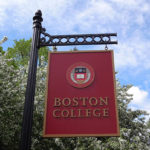2012 ONGOING CASE: Boston College Requests Two Witnesses Be Barred From Testifying For John Doe
Boston College has asked for two witnesses to be barred from testifying in a lawsuit brought against the University by an alumnus over 2012 disciplinary proceedings related to sexual assault allegations. The case is scheduled to go to a jury trial on Sept. 16. The alumnus–identified only as “John Doe” in court documents–was originally suspended for three semesters, and he is seeking $3 million in damages and an expunged disciplinary record from BC. The University is attempting to bar a BC alumna and family friend of Doe, as well as Doe’s roommate.
The reason this issue requires a jury trial, ultimately, is that the facts in dispute between the two sides specifically relate to email conversations between Chebator, Hughes, and former Program Manager in the Office of Residential Life Catherine-Mary Rivera about Doe’s disciplinary hearing: Doe believes that conversation was decisive, the University believes that contact was incidental to the decision, and the appeals court judges do not believe that the issue is so clear that it can be ruled upon in summary judgment.
The decision written by First Circuit Judge Juan R. Torruella, who presided over the case on appeal in the summer of 2018 notes that BC’s disciplinary board had trouble coming to a decision and considered making a “no finding” determination. That means that neither an innocent or guilty verdict would be issued…The jury will be tasked with evaluating whether the University broke its contract by not properly taking into account Doe’s defense—that another person committed the alleged assault.
The plaintiff’s counterargument is that the two witnesses will provide details regarding the “sequence of events in 2012.” Doe argues that both witness testimonies will “corroborate that John’s ‘key defense [was] that someone other than [him] committed the alleged sexual assault,’ and affirm based on their contemporaneous perception of the events following John’s arrest that his alternative culprit defense was genuine from the outset and not a post hoc justification concocted by his attorneys.”
bcheights-Jack Goldman

